Dictionary for generic data types. More...
Data Types | |
| type | dict_typ |
| type | int_t |
| type | real_fived_t |
| type | real_fourd_t |
| type | real_t |
| type | real_threed_t |
| type | real_twod_t |
Functions/Subroutines | |
| subroutine, public | initdict () |
| subroutine, public | closedict () |
| type(dict_typ) function, pointer | findpath (root, key, create) |
| Search for the path in 'key' beginning at root and return a pointer to this node in 'res'. If create is set to true (default is false), the path is created if it is not existing. If create=false and the path does not exist, res is null(). More... | |
| recursive subroutine | setattr0a (root, key, value) |
| Set the dictionary 'value' as child at the path 'key' relative to 'root'. If a child at this path is already existing, it will be deleted. More... | |
| subroutine | setattr0b (root, key, value, type) |
| Create an empty node at path 'key' relative to 'root', if value and type are not defined. If they are defined, also fill the node with data. More... | |
| subroutine | getattr0a (root, key, parent) |
| Retrieve the node at path 'key' relative to 'root'. The result will be given as third argument 'parent'. If the path can not be found, the result is null(). More... | |
| subroutine | getattr0b (root, key, type, value, default) |
| Retrieve the data 'value' of kind 'type' at path 'key' relative to 'root'. If the path can not be found and default is not defined, an error is raised. If default is present, it is set and returned instead. More... | |
| type(dict_typ) function, pointer | findchild (root, key) |
| Find the direct child with key 'key' in a list of childs. 'root' points to the first child. If 'key' is not found, null() is returned. More... | |
| type(dict_typ) function, pointer, public | getnext (root) |
| Get the pointer to the next child. More... | |
| type(dict_typ) function, pointer | getlast (root) |
| Get the pointer to the last child. More... | |
| type(dict_typ) function, pointer, public | getchild (root) |
| Get the pointer to a direct child of the pointer 'root'. More... | |
| function, public | getkey (root) |
| Get the key of pointer 'root'. More... | |
| integer function, public | getdatasize (root) |
| Get the size of the data in node 'root'. If there is no data 0 is returned. note: This is also the byte size of the data. More... | |
| integer function, public | getdatatype (root) |
| Return the datatype of node 'root'. More... | |
| pointer, public | getdata (root) |
| Return the datatype of node 'root'. More... | |
| logical function, public | haschild (root) |
| Check if the node 'root' has one or more children. More... | |
| logical function, public | hasdata (root) |
| Checks if the node 'root' has data associated. More... | |
| logical function, public | haskey (root, key) |
| Checks if a node with key 'key' exists. More... | |
| subroutine, public | setdata (node, val) |
| Set data of 'node' ot 'val'. More... | |
| function | tokenize (key, back) |
| Cuts a path into two tokens, which is explained best with an example: back=.FALSE.: key = /sources/grav/mass => res = sources, key = /grav/mass back=.TRUE.: key = /sources/grav/mass => res = mass, key = /sources/grav. More... | |
| type(dict_typ) function, pointer, public | dict (n1, n2, n3, n4, n5, n6, n7, n8, n9, n10, n11, n12, n13, n14, n15, n16, n17, n18, n19, n20) |
| Construct a new dictionary from several key/value pairs. Together with the Assign subroutine and overloading the '/'-operator, this makes the syntactic sugar available to write the following syntax: physics => Dict( "problem" / EULER2D, & "gamma" / GAMMA) More... | |
| subroutine | setattr1 (root, key, val) |
| subroutine | setattr2 (root, key, val) |
| subroutine | setattr3 (root, key, val) |
| subroutine | setattr4 (root, key, val) |
| subroutine | setattr5 (root, key, val) |
| subroutine | setattr6 (root, key, val) |
| subroutine | setattr7 (root, key, val) |
| subroutine | setattr8 (root, key, val) |
| subroutine | setattr9 (root, key, val) |
| subroutine | setattr10 (root, key, val) |
| subroutine | setattr11 (root, key, val) |
| subroutine | setattr12 (root, key, val) |
| recursive subroutine, public | printdict (root, prefix) |
| recursive subroutine, public | copydict (root, outdir) |
| Copy complete Dictionary. More... | |
| recursive subroutine, public | copyhierarchy (root, outdir) |
| Copy all nodes, which have children from 'root' to 'outdir'. More... | |
| subroutine | getattr0 (root, key, res) |
| Return the node at path 'key' relative to 'root' in 'res'. If this node has no data, but a child (e.g. a directory), return the child instead. More... | |
| subroutine | getattr1 (root, key, res, default) |
| subroutine | getattr2 (root, key, res, default) |
| subroutine | getattr3 (root, key, res, default) |
| subroutine | getattr4 (root, key, res, default) |
| subroutine | getattr5 (root, key, res, default) |
| subroutine | getattr6 (root, key, res, default) |
| subroutine | getattr7 (root, key, res, default) |
| subroutine | getattr8 (root, key, res, default) |
| subroutine | getattr9 (root, key, res, default) |
| subroutine | getattr10 (root, key, res, default) |
| subroutine | getattr11 (root, key, res, default) |
| subroutine | getattr12 (root, key, res, default) |
| subroutine | deletenode (node, k) |
| recursive subroutine, public | deletedict (root) |
| Delete the dictionary 'root' and all subnodes. More... | |
| type(dict_typ) function, pointer | assign0 (key, val) |
| type(dict_typ) function, pointer | assign1 (key, val) |
| type(dict_typ) function, pointer | assign2 (key, val) |
| type(dict_typ) function, pointer | assign3 (key, val) |
| type(dict_typ) function, pointer | assign4 (key, val) |
| type(dict_typ) function, pointer | assign5 (key, val) |
| type(dict_typ) function, pointer | assign6 (key, val) |
| type(dict_typ) function, pointer | assign7 (key, val) |
| type(dict_typ) function, pointer | assign8 (key, val) |
| type(dict_typ) function, pointer | assign9 (key, val) |
| type(dict_typ) function, pointer | assign10 (key, val) |
| type(dict_typ) function, pointer | assign11 (key, val) |
| type(dict_typ) function, pointer | assign12 (key, val) |
| type(real_t) function | ref1 (p) |
| type(int_t) function | ref2 (p) |
Variables | |
| integer, parameter, public | max_char_len = 128 |
| integer, parameter, public | dict_none = 0 |
| integer, parameter, public | dict_int = 1 |
| integer, parameter, public | dict_real = 2 |
| integer, parameter, public | dict_char = 3 |
| integer, parameter, public | dict_bool = 4 |
| integer, parameter, public | dict_real_oned = 5 |
| integer, parameter, public | dict_real_twod = 6 |
| integer, parameter, public | dict_real_threed = 7 |
| integer, parameter, public | dict_real_fourd = 8 |
| integer, parameter, public | dict_int_oned = 9 |
| integer, parameter, public | dict_real_p = 10 |
| integer, parameter, public | dict_int_p = 11 |
| integer, parameter, public | dict_real_fived = 12 |
| type(logging_base), save | this |
Detailed Description
Dictionary for generic data types.
This module defines a dictionary (key/value storage) of arbitrary data types. At the moment the following are defined:
- Integer
- Real
- Character(len=MAX_CHAR_LEN)
- Logical
- 1D Real array
- Pointer to 2D Real array
- Pointer to 3D Real array
- Pointer to 4D Real array
- 1D Integer array
- Pointer to Real
- Pointer to Integer
- Pointer to 5D Real array
The dictionary is implemented as Trie(1) with comprepressed keys, which is called radix tree(2). Each node can hold data with a defined type, which is stored in a generic container with the TRANSFER intrinsic(3). This technique has been explained in (4), see also (5). Each node can have severall children. 'child' points to the first child and other can be found by iterating to the 'next' one.
References
- http://en.wikipedia.org/wiki/Trie
- http://en.wikipedia.org/wiki/Radix_tree
- http://fortranwiki.org/fortran/show/transfer
- Jason R. Blevins. A generic linked list implementation in fortran 95. [2]
- http://fortranwiki.org/fortran/show/gen_list
Function/Subroutine Documentation
◆ assign0()
|
private |
Definition at line 1161 of file common_dict.f90.
◆ assign1()
|
private |
Definition at line 1174 of file common_dict.f90.
◆ assign10()
|
private |
Definition at line 1290 of file common_dict.f90.
◆ assign11()
|
private |
Definition at line 1303 of file common_dict.f90.
◆ assign12()
|
private |
Definition at line 1316 of file common_dict.f90.
◆ assign2()
|
private |
Definition at line 1187 of file common_dict.f90.
◆ assign3()
|
private |
Definition at line 1200 of file common_dict.f90.
◆ assign4()
|
private |
Definition at line 1212 of file common_dict.f90.
◆ assign5()
|
private |
Definition at line 1225 of file common_dict.f90.
◆ assign6()
|
private |
Definition at line 1238 of file common_dict.f90.
◆ assign7()
|
private |
Definition at line 1251 of file common_dict.f90.
◆ assign8()
|
private |
Definition at line 1264 of file common_dict.f90.
◆ assign9()
|
private |
Definition at line 1277 of file common_dict.f90.
◆ closedict()
| subroutine, public common_dict::closedict |
◆ copydict()
| recursive subroutine, public common_dict::copydict | ( | type(dict_typ), pointer | root, |
| type(dict_typ), pointer | outdir | ||
| ) |
Copy complete Dictionary.
Definition at line 773 of file common_dict.f90.


◆ copyhierarchy()
| recursive subroutine, public common_dict::copyhierarchy | ( | type(dict_typ), pointer | root, |
| type(dict_typ), pointer | outdir | ||
| ) |
Copy all nodes, which have children from 'root' to 'outdir'.
Definition at line 805 of file common_dict.f90.


◆ deletedict()
| recursive subroutine, public common_dict::deletedict | ( | type(dict_typ), pointer | root | ) |
Delete the dictionary 'root' and all subnodes.
Definition at line 1141 of file common_dict.f90.


◆ deletenode()
|
private |
◆ dict()
| type(dict_typ) function, pointer, public common_dict::dict | ( | type(dict_typ), pointer | n1, |
| type(dict_typ), optional, pointer | n2, | ||
| type(dict_typ), optional, pointer | n3, | ||
| type(dict_typ), optional, pointer | n4, | ||
| type(dict_typ), optional, pointer | n5, | ||
| type(dict_typ), optional, pointer | n6, | ||
| type(dict_typ), optional, pointer | n7, | ||
| type(dict_typ), optional, pointer | n8, | ||
| type(dict_typ), optional, pointer | n9, | ||
| type(dict_typ), optional, pointer | n10, | ||
| type(dict_typ), optional, pointer | n11, | ||
| type(dict_typ), optional, pointer | n12, | ||
| type(dict_typ), optional, pointer | n13, | ||
| type(dict_typ), optional, pointer | n14, | ||
| type(dict_typ), optional, pointer | n15, | ||
| type(dict_typ), optional, pointer | n16, | ||
| type(dict_typ), optional, pointer | n17, | ||
| type(dict_typ), optional, pointer | n18, | ||
| type(dict_typ), optional, pointer | n19, | ||
| type(dict_typ), optional, pointer | n20 | ||
| ) |
Construct a new dictionary from several key/value pairs. Together with the Assign subroutine and overloading the '/'-operator, this makes the syntactic sugar available to write the following syntax: physics => Dict( "problem" / EULER2D, & "gamma" / GAMMA)
Definition at line 559 of file common_dict.f90.

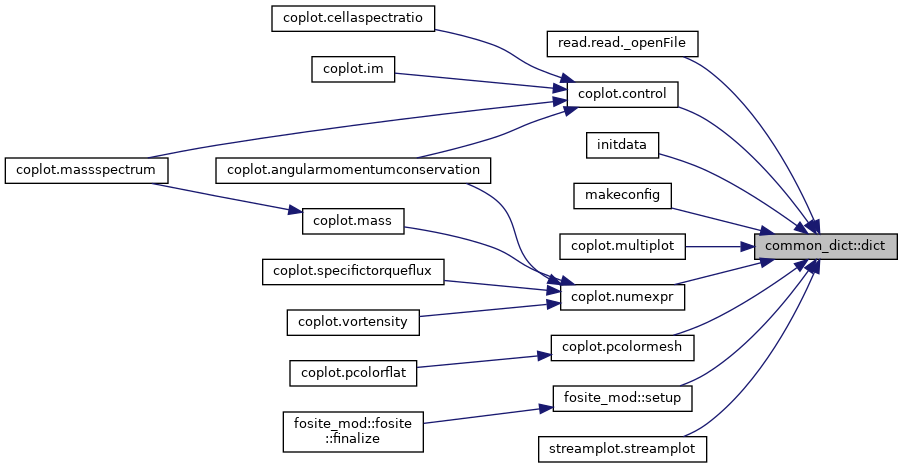
◆ findchild()
|
private |
Find the direct child with key 'key' in a list of childs. 'root' points to the first child. If 'key' is not found, null() is returned.
Definition at line 377 of file common_dict.f90.
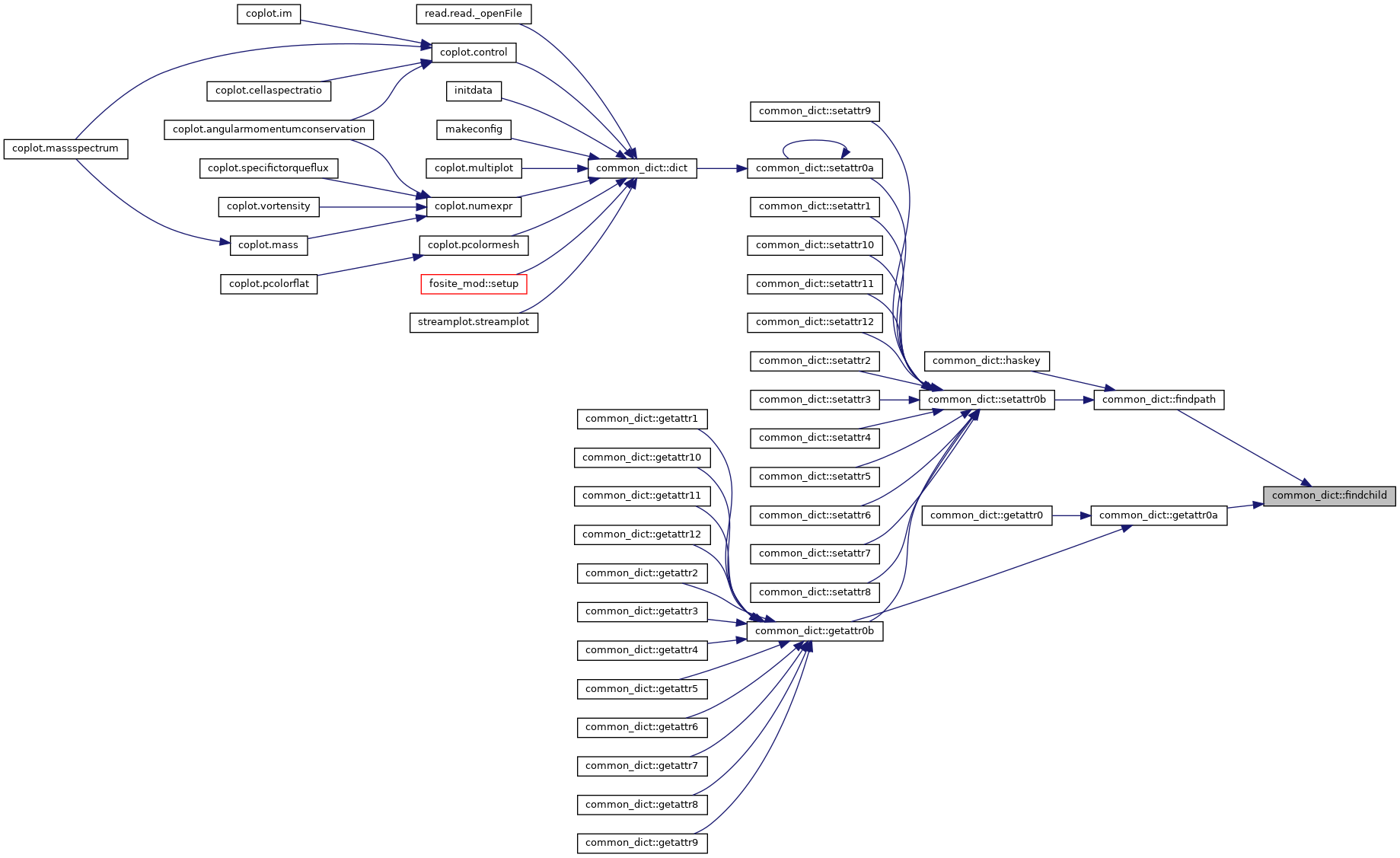
◆ findpath()
|
private |
Search for the path in 'key' beginning at root and return a pointer to this node in 'res'. If create is set to true (default is false), the path is created if it is not existing. If create=false and the path does not exist, res is null().
Definition at line 201 of file common_dict.f90.
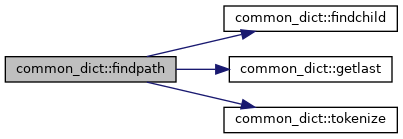
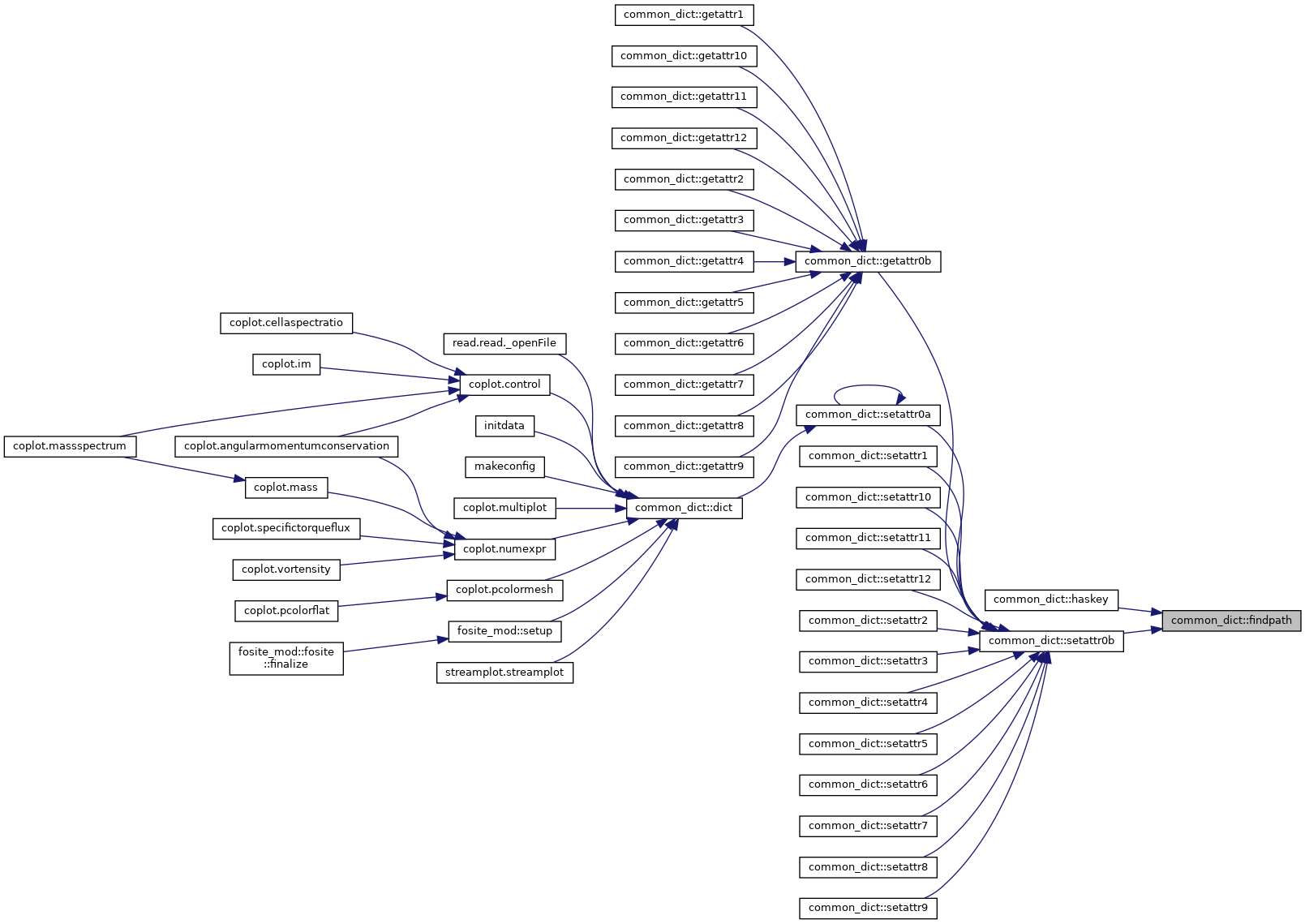
◆ getattr0()
|
private |
Return the node at path 'key' relative to 'root' in 'res'. If this node has no data, but a child (e.g. a directory), return the child instead.
Definition at line 831 of file common_dict.f90.

◆ getattr0a()
|
private |
Retrieve the node at path 'key' relative to 'root'. The result will be given as third argument 'parent'. If the path can not be found, the result is null().
Definition at line 314 of file common_dict.f90.

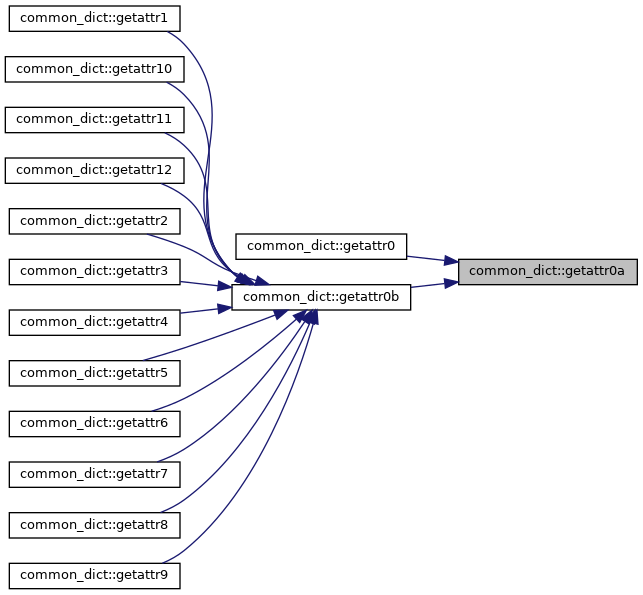
◆ getattr0b()
|
private |
Retrieve the data 'value' of kind 'type' at path 'key' relative to 'root'. If the path can not be found and default is not defined, an error is raised. If default is present, it is set and returned instead.
Definition at line 341 of file common_dict.f90.

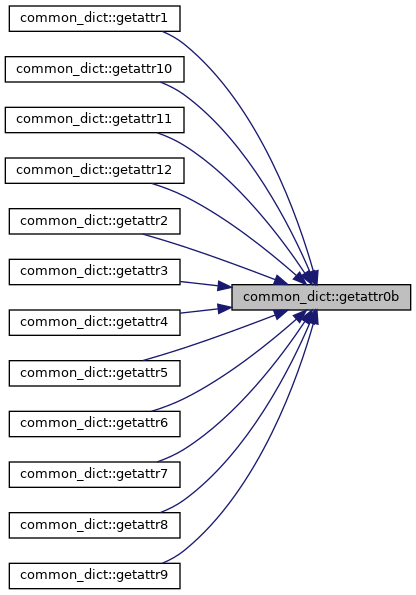
◆ getattr1()
|
private |
◆ getattr10()
◆ getattr11()
◆ getattr12()
|
private |
◆ getattr2()
|
private |
◆ getattr3()
|
private |
◆ getattr4()
|
private |
◆ getattr5()
|
private |
◆ getattr6()
|
private |
◆ getattr7()
|
private |
◆ getattr8()
|
private |
◆ getattr9()
|
private |
◆ getchild()
Get the pointer to a direct child of the pointer 'root'.
Definition at line 414 of file common_dict.f90.
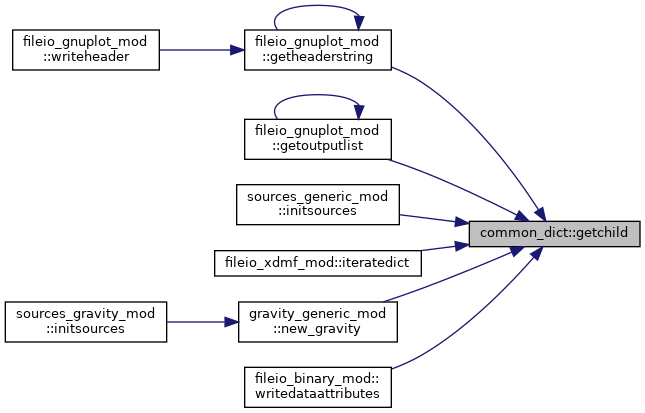
◆ getdata()
| pointer, public common_dict::getdata | ( | type(dict_typ), pointer | root | ) |
Return the datatype of node 'root'.
Definition at line 459 of file common_dict.f90.

◆ getdatasize()
| integer function, public common_dict::getdatasize | ( | type(dict_typ), pointer | root | ) |
Get the size of the data in node 'root'. If there is no data 0 is returned. note: This is also the byte size of the data.
Definition at line 435 of file common_dict.f90.
◆ getdatatype()
| integer function, public common_dict::getdatatype | ( | type(dict_typ), pointer | root | ) |
Return the datatype of node 'root'.
Definition at line 449 of file common_dict.f90.
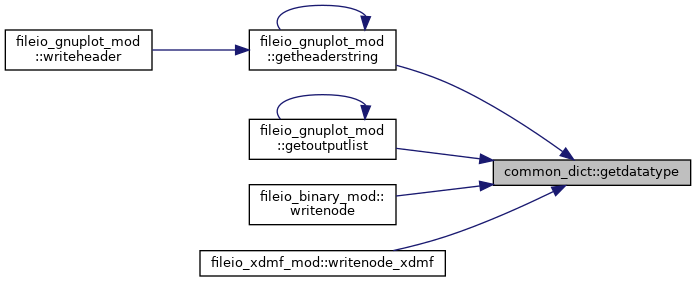
◆ getkey()
| function, public common_dict::getkey | ( | type(dict_typ), pointer | root | ) |
Get the key of pointer 'root'.
Definition at line 423 of file common_dict.f90.
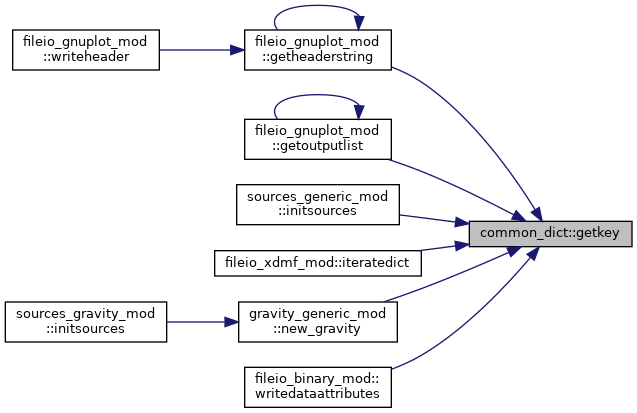
◆ getlast()
Get the pointer to the last child.
Definition at line 400 of file common_dict.f90.
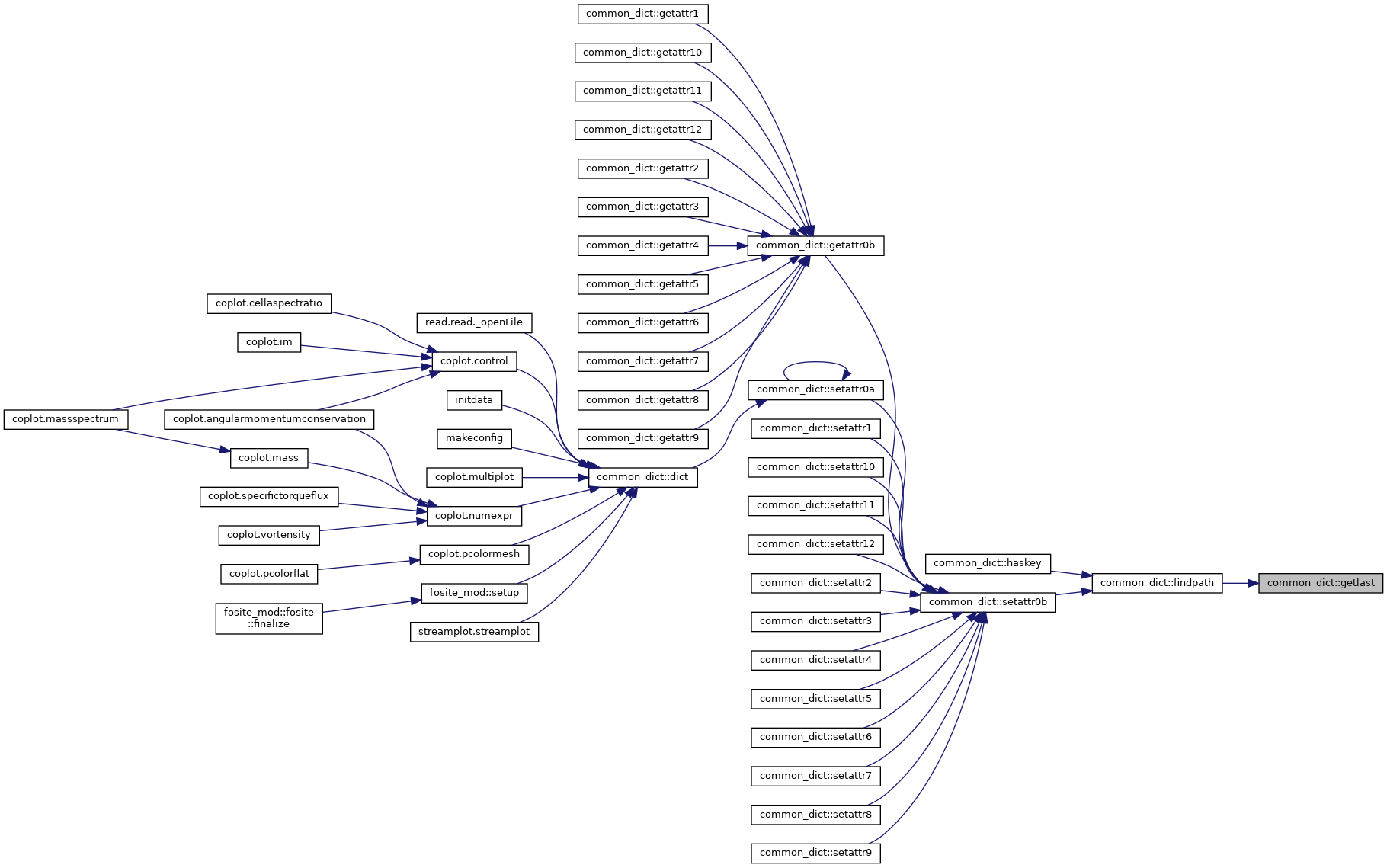
◆ getnext()
Get the pointer to the next child.
Definition at line 391 of file common_dict.f90.
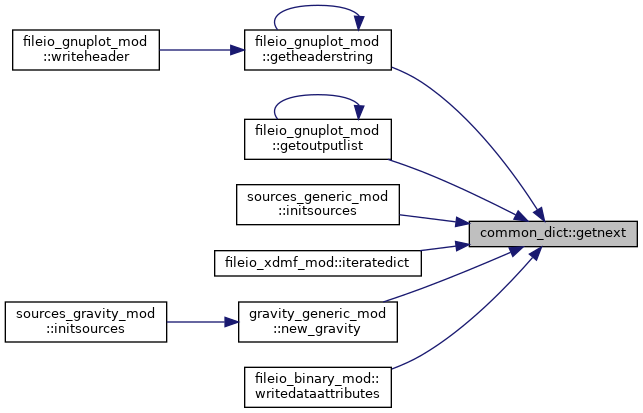
◆ haschild()
| logical function, public common_dict::haschild | ( | type(dict_typ), pointer | root | ) |
Check if the node 'root' has one or more children.
Definition at line 469 of file common_dict.f90.
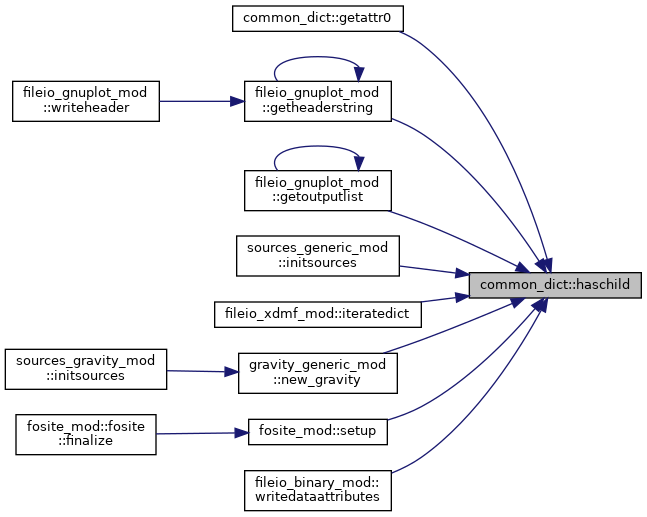
◆ hasdata()
| logical function, public common_dict::hasdata | ( | type(dict_typ), pointer | root | ) |
Checks if the node 'root' has data associated.
Definition at line 479 of file common_dict.f90.

◆ haskey()
| logical function, public common_dict::haskey | ( | type(dict_typ), pointer | root, |
| character(len=*) | key | ||
| ) |
Checks if a node with key 'key' exists.
Definition at line 489 of file common_dict.f90.

◆ initdict()
| subroutine, public common_dict::initdict |
◆ printdict()
| recursive subroutine, public common_dict::printdict | ( | type(dict_typ), target | root, |
| character(len=*), optional | prefix | ||
| ) |
Definition at line 743 of file common_dict.f90.


◆ ref1()
|
private |
Definition at line 1329 of file common_dict.f90.
◆ ref2()
|
private |
Definition at line 1338 of file common_dict.f90.
◆ setattr0a()
|
private |
Set the dictionary 'value' as child at the path 'key' relative to 'root'. If a child at this path is already existing, it will be deleted.
Definition at line 265 of file common_dict.f90.

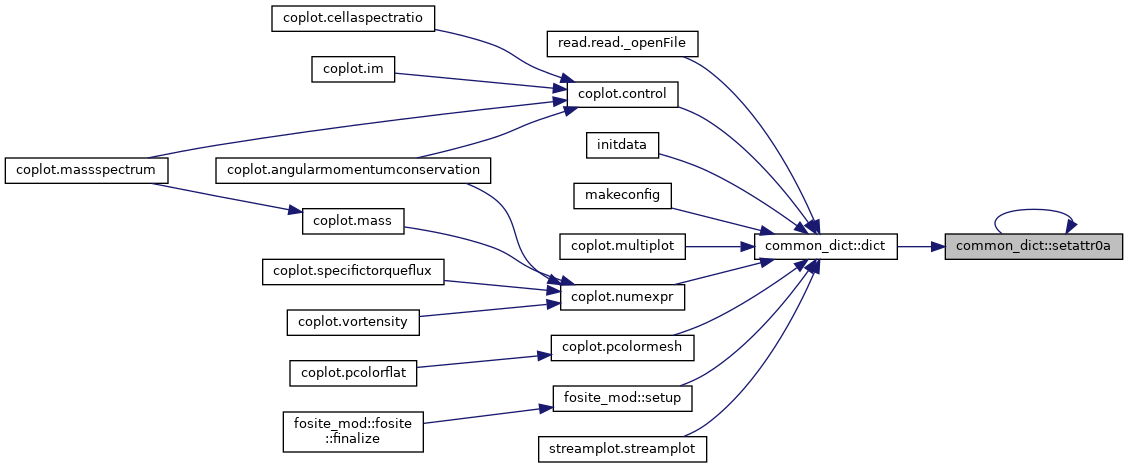
◆ setattr0b()
|
private |
Create an empty node at path 'key' relative to 'root', if value and type are not defined. If they are defined, also fill the node with data.
Definition at line 294 of file common_dict.f90.

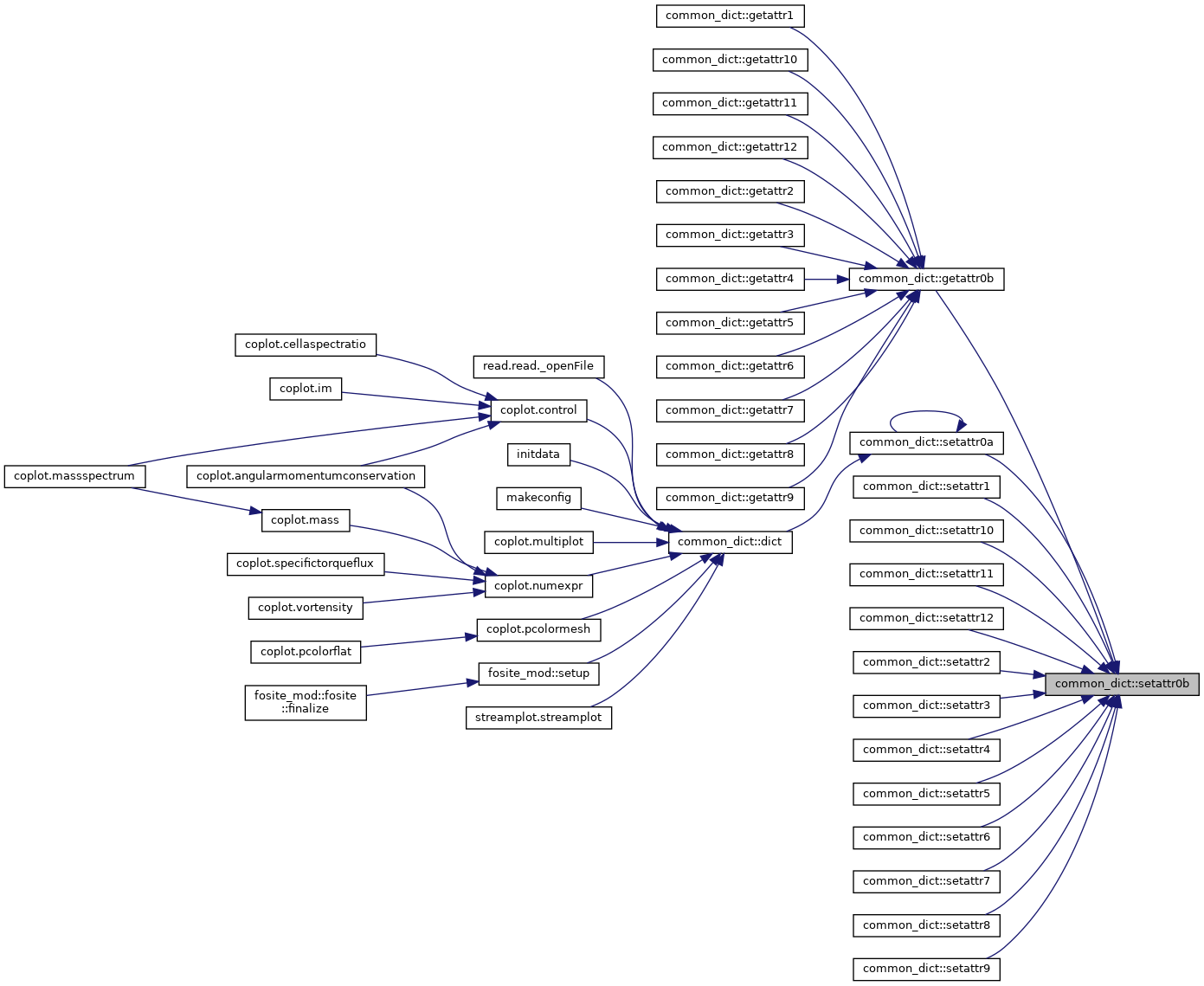
◆ setattr1()
|
private |
◆ setattr10()
◆ setattr11()
◆ setattr12()
|
private |
◆ setattr2()
|
private |
◆ setattr3()
|
private |
◆ setattr4()
|
private |
◆ setattr5()
|
private |
◆ setattr6()
|
private |
◆ setattr7()
|
private |
◆ setattr8()
|
private |
◆ setattr9()
|
private |
◆ setdata()
| subroutine, public common_dict::setdata | ( | type(dict_typ), pointer | node, |
| intent(in) | val | ||
| ) |
Set data of 'node' ot 'val'.
Definition at line 500 of file common_dict.f90.
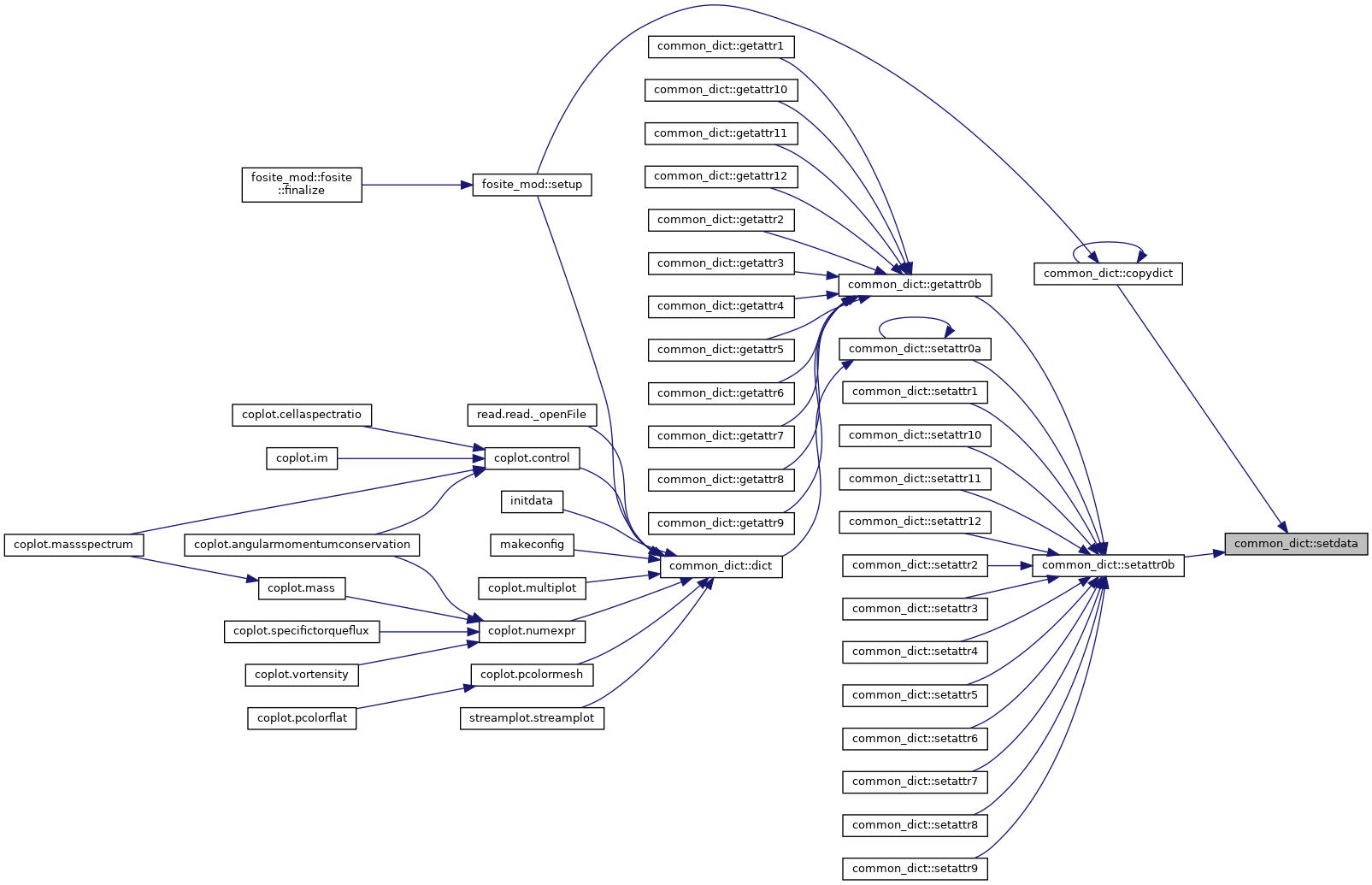
◆ tokenize()
|
private |
Cuts a path into two tokens, which is explained best with an example: back=.FALSE.: key = /sources/grav/mass => res = sources, key = /grav/mass back=.TRUE.: key = /sources/grav/mass => res = mass, key = /sources/grav.
Definition at line 519 of file common_dict.f90.
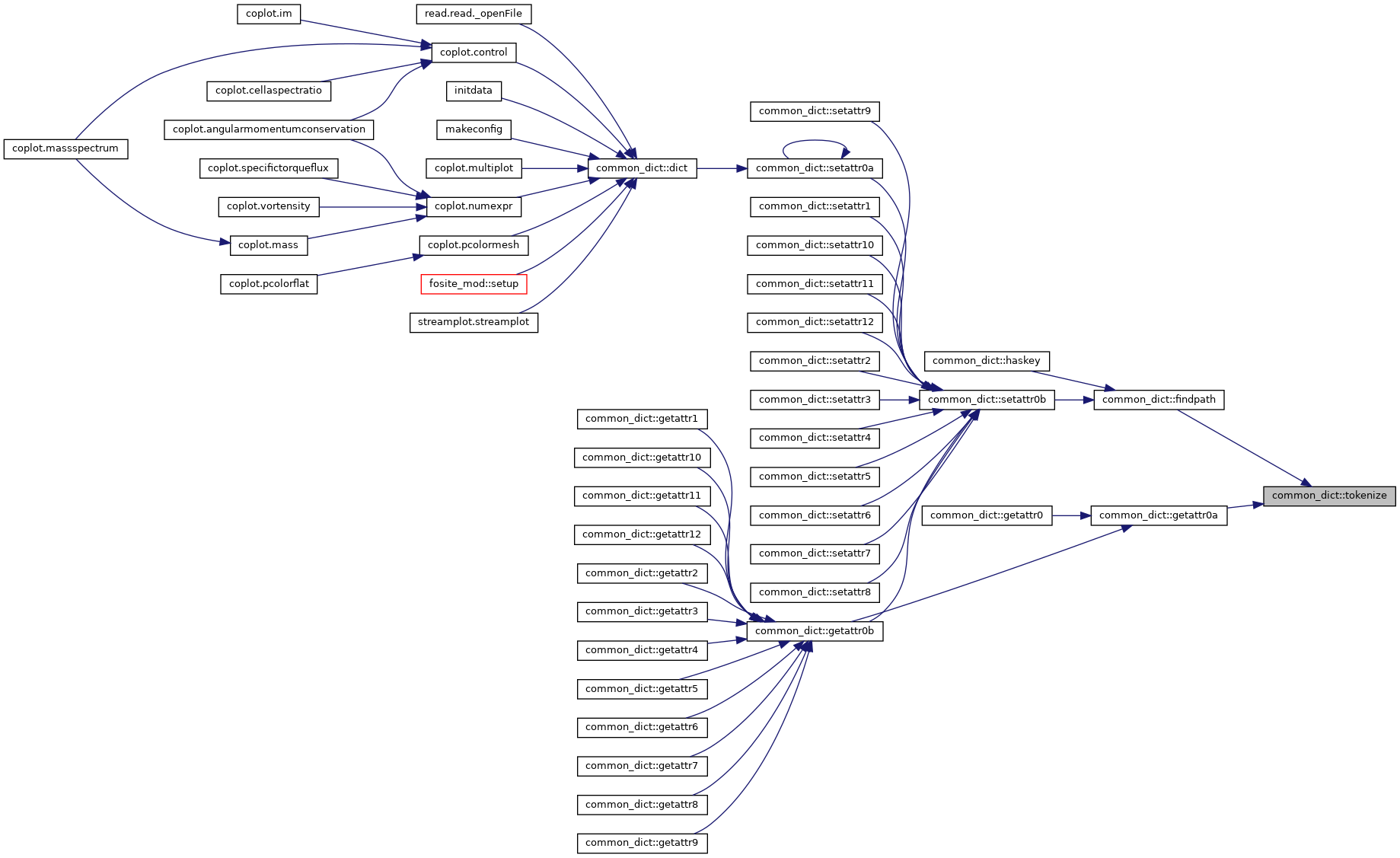
Variable Documentation
◆ dict_bool
| integer, parameter, public common_dict::dict_bool = 4 |
Definition at line 97 of file common_dict.f90.
◆ dict_char
| integer, parameter, public common_dict::dict_char = 3 |
Definition at line 96 of file common_dict.f90.
◆ dict_int
| integer, parameter, public common_dict::dict_int = 1 |
Definition at line 94 of file common_dict.f90.
◆ dict_int_oned
| integer, parameter, public common_dict::dict_int_oned = 9 |
Definition at line 102 of file common_dict.f90.
◆ dict_int_p
| integer, parameter, public common_dict::dict_int_p = 11 |
Definition at line 104 of file common_dict.f90.
◆ dict_none
| integer, parameter, public common_dict::dict_none = 0 |
Definition at line 93 of file common_dict.f90.
◆ dict_real
| integer, parameter, public common_dict::dict_real = 2 |
Definition at line 95 of file common_dict.f90.
◆ dict_real_fived
| integer, parameter, public common_dict::dict_real_fived = 12 |
Definition at line 105 of file common_dict.f90.
◆ dict_real_fourd
| integer, parameter, public common_dict::dict_real_fourd = 8 |
Definition at line 101 of file common_dict.f90.
◆ dict_real_oned
| integer, parameter, public common_dict::dict_real_oned = 5 |
Definition at line 98 of file common_dict.f90.
◆ dict_real_p
| integer, parameter, public common_dict::dict_real_p = 10 |
Definition at line 103 of file common_dict.f90.
◆ dict_real_threed
| integer, parameter, public common_dict::dict_real_threed = 7 |
Definition at line 100 of file common_dict.f90.
◆ dict_real_twod
| integer, parameter, public common_dict::dict_real_twod = 6 |
Definition at line 99 of file common_dict.f90.
◆ max_char_len
| integer, parameter, public common_dict::max_char_len = 128 |
Definition at line 92 of file common_dict.f90.
◆ this
|
private |
Definition at line 149 of file common_dict.f90.

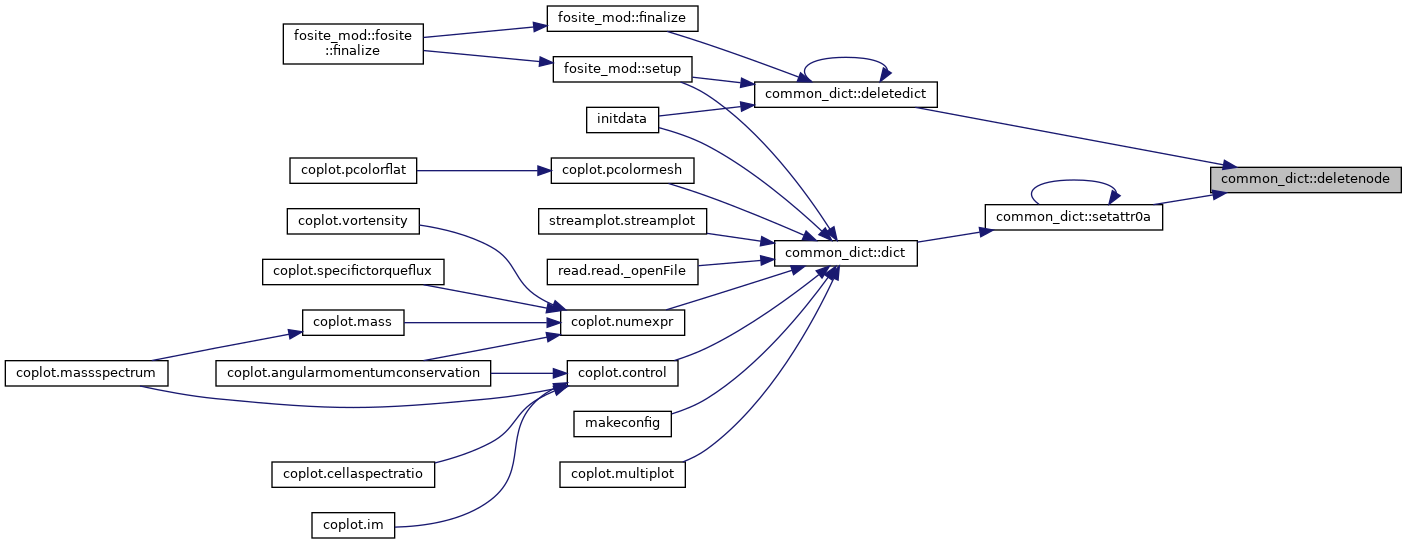

























 1.9.4
1.9.4